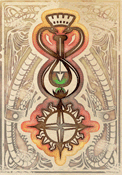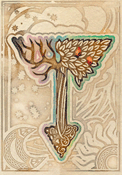Below are the skills any of every set of characters can have at their disposal; however, each member may only have up to 7 skills in all, which we will call your character's major skills. These skills will define your character, and ultimately decide his/her progress in the RPG. The skills are divided into three categories: combat, stealth and magic.
CombatBlunt
Blunt is the skill that governs how well your character can use crushing weapons, such as maces, hammers, and axes. Improving your blunt skill allows you to deliver more damage with crushing weapons, and gives you access to power attacks.
Novice: Able to use Blunt weapons in-character formidably.
Apprentice: Weight of blunt weapons is decreased by 10%. Strength of blunt weapons is increased by 10%.
Journeyman: Weight of blunt weapons is decreased by 25%. Strength of blunt weapons is increased by 25%.
Expert: Weight of blunt weapons is decreased by 50%. Strength of blunt weapons is increased by 50%.
Master: Ability to dual-wield blunt weapons. Strength of blunt weapons is increased by 80%.
Blade
Blade is the skill that governs how well your character can use short handled sharp weapons such as daggers, swords, claymores, katanas, and cutlasses (axes are hafted weapons and considered Blunt). Improving your blade skill allows you to deliver more damage with sharp weapons, and gives you access to power attacks.
Novice: Able to use bladed weaponry in-character formidably.
Apprentice: Speed of bladed weapons is increased by 5%. Sharpness rating of bladed weapons is increased by 5%.
Journeyman: Speed of bladed weapons is increased by 10%. Sharpness rating of bladed weapons is increased by 15%.
Expert: Speed of bladed weapons is increased by 25%. Sharpness rating of bladed weapons is increased by 25%.
Master: Ability to dual-wield bladed weapons formidably. Speed of bladed weapons is increased by 50%. Sharpness rating of bladed weapons is increased by 65%.
Hand to Hand
Hand to Hand is the skill that governs how well your character can attack enemies using only physical form. Hand to Hand attacks damage both the opponent's Health and Fatigue, unlike other types of melee attack. Improving your hand to Hand skill allows you to deliver more damage with your physical skills.
Novice: Able to use Hand to Hand in-character formidably.
Apprentice: Speed of hand to hand combat is increased by 10%. Strength of hand to hand combat is increased by 10%.
Journeyman: Speed of hand to hand combat is increased by 15%. Strength of hand to hand combat is increased by 15%.
Expert: Speed of hand to hand combat is increased by 30%. Strength of hand to hand combat is increased by 45%.
Master: Allows you to see and create "shatterpoints" on opponents, which are basically weak points on the target's body, except the ones you create become dramatically weaker. The shatterpoints a master can see only apply to the opponent's body, not his/her armor - which may differ. Speed of hand to hand combat is increased by 45%. Strength of hand to hand combat is increased by 75%.
Block
Block allows you to reduce damage from melee and ranged combat, using a shield, weapon, or your hands. At higher levels, block gives you a chance to recoil, disarm, or knock down your opponent.
Novice: Allows you to block others who are formidable with blunt, blade and hand to hand without your block being broken more easily in physical combat.
Apprentice: Strength of block is increased by 10%. Damage dealt to a character is reduced by 5%.
Journeyman: Strength of block is increased by 25%. Damage dealt to a character is reduced by 10%.
Expert: Strength of block is increased by 50%. Damage dealt to a character is reduced by 25%.
Master: Strength of a block is increased by 75%. Damage dealt to a character is reduced by 50%.
Armorer
Armorer governs the use of repair hammers to repair both armor and weapons. As your skill improves, you can repair items more efficiently and will break repair hammers less often. This skill also allows you to forge your own weapons and armor.
Novice: Allows you to repair armor and weaponry that has been damaged in a fight.
Apprentice: Allows you to forge low-grade armor and weaponry.
Journeyman: Allows you to repair even magical armor and weaponry that has been damaged in a fight.
Expert: Allows you to forge high-grade armor and weaponry.
Master: Can forge armor and weaponry out of some of the most powerful materials. Enables you to start your own blacksmith shop, and gives you special access to an Altar of Enchantment to forge magical armor and weaponry. Additionally, it allows you to create and see the "shatterpoints" or weak spots of an armor, and use them dramatically to your advantage.
Heavy Armor
The Heavy Armor skill determines how much protection is provided by heavyweight armor, how much damage heavy armor takes, and how much heavy armor encumbers you.
Novice: Allows you to wear Heavy Armor.
Apprentice: Defensive rating increased by 10%. Weight decreased by 10%.
Journeyman: Defensive rating increased by 20%. Weight decreased by 15%.
Expert: Defensive rating increased by 30%. Weight decreased by 25%.
Master: Defensive rating increased by 60%. Weight decreased by 50%.
StealthMarksman
Marksman is the art of using bows and arrows as well as crossbows and bolts. It significantly increases the damage of a ranged attack, trajectory and accuracy.
Novice: Allows you to wield a bow and arrows above the average wielder's precision/acuteness.
Apprentice: +10m range. Damaged increased by 10%.
Journeyman: +25m range. Damage increased by 20%.
Expert: +40m range. Damage increased by 30%.
Master: Ability to fire up to 10 projectiles at once. +50m range. Damage increased by 40%.
Security
Security is basically a polite word for lock-picking. Throughout the world you will find lockpicks on creatures (goblins and bandits tend to drop them, for example), and in chests. These can be used to pick locks on chests and doors that you will find everywhere. Additionally this skill allows you to devise your own traps and gadgets used for well... Security, and/or a means of thievery.
Novice: Able to pick-lock of entrances/exits of low-security structures.
Apprentice: Able to set down low-leveled traps. Able to pick-lock of low-leveled containers.
Journeyman: Able to create low-leveled devices. Able to set down medium-leveled traps, and de-activate low-leveled traps.
Expert: Able to pick-lock of entrances/exits of high-security structures and medium-leveled containers. Able to set down medium-leveled traps, and de-activate low-leveled traps.
Master: Ability to pick-lock of magical structures and containers. Able to pick-lock of high-leveled containers. Able to set down high-leveled traps that have the capacity to affect a wide area. Able to de-activate medium-leveled traps. Able to create high-leveled devices.
Sneak
The sneak skill allows you to move around undetected, pick pockets, and deal more damage to targets if you attack while sneaking.
Novice: Can move slightly quieter then the average person under various circumstances.
Apprentice: The weight of your equipment has no affect on the sound of your movements.
Journeyman: The speed of your sneaking ability can reach even the speeds of your running movement.
Expert: The heat of your body remains undetected no matter how close you are to to others, also your visibility to their eyes is partially faded while sneaking.
Master: You can completely camouflage with your surroundings, and like a shadow maneuver throughout the vicinity without being detected very easily - unless through contact with another person and/or object.
Acrobatics
Acrobatics allows your character to jump higher and fall further (without damage). At higher levels, jumping can be incorporated into combat. This also increases your nimbleness and flexibility in combat.
Novice: Balance and flexibility is increased by 10%.
Apprentice: Balance and flexibility is increased by 20%.
Journeyman: Balance and flexibility is increased by 30%.
Expert: Balance and flexibility is increased by 50%.
Master: Ability to cling onto about any surface, as though terrain or bodily position has no effect on your movement. Reach is increased by 20%. Balance and flexibility is increased by 75%.
Athletics
Athletics is the skill that determines how quickly you run and swim. As your level increases, your Fatigue regenerates progressively faster when running. In other words you'll have superior endurance compared to others, and able to last longer in fights.
Novice: Increases stamina by 10%. Increases physical durability by 5%. Increases speed by 10%.
Apprentice: Increases stamina by 20%. Increases physical durability by 10%. Increases speed by 20%.
Journeyman: Increases stamina by 30%. Increases physical durability by 20%. Increases speed by 30%.
Expert: Increases stamina by 40%. Increases physical durability by 35%. Increases speed by 40%.
Master: Increases stamina by 50%. Increases physical durability by 50%. Increases speed by 60%.
Light Armor
The Light Armor skill determines how much protection is provided by lightweight armor, and how much damage light armor takes each time it is hit.
Novice: Allows you to wear Light Armor.
Apprentice: Defense rating increased by 10%.
Journeyman: Defense rating increased by 20%.
Expert: Defense rating increased by 30%.
Master: Defense rating increased by %50.
Mercantile
Mercantile skill governs haggling, which allows you to sell goods to merchants for more while buying for less. It ties in with Speechcraft.
Novice: Gives you a 5% discount on experience points and word-count when leveling a skill up.
Apprentice: Gives you a 10% discount on experience points and word-count when leveling a skill up.
Journeyman: Gives you a 15% discount on experience points and word-count when leveling a skill up.
Expert: Gives you a 20% discount on experience points and word-count when leveling a skill up. Allows you to start your own business in-character.
Master: Gives you a 25% discount on experience points and word-count when leveling a skill up. Allows you to start your own company, and earn quite a few bodyguards and workers in the process.
Speechcraft
Speechcraft affects disposition, i.e., how people react to you and how much they like you. Speechcraft can also be used to lower the disposition of others below their aggressiveness toward your character. In other words, you have a sharp, inspiring tongue.
Novice: Makes you an above-average speaker with others.
Apprentice: Allows you to calm, charm, demoralize, frenzy and rally a crowd within 10m. Most likely you will only be inspiring the peasants of a set area.
Journeyman: Allows you to calm, charm, demoralize, frenzy and rally a crowd within 20m. You are capable of inspiring the peasants, middle-class and warrior-class.
Expert: Allows you to calm, charm, demoralize, frenzy and rally a crowd within 50m. You are capable of inspiring the clergy, nobles and high-class denizens.
Master: Allows you to calm, charm, demoralize, frenzy and rally a crowd within a 100m. Even the highest ranking members of society will have trouble not falling under your sway or influence.
MagicConjuration
Conjuration is the magic of summoning creatures from other planes, creating magical weapons and armor, and repelling undead creatures. Summoning creatures is particularly useful, providing the spellcaster with an ally in combat. A wide range of different creatures can be summoned, depending upon the spellcaster's ability.
Novice: Gives you the ability to conjure small, conventional weaponry, as well as the low-level creatures.
Apprentice: Gives you the ability to conjure typical weaponry, as well as low-level daedra/undead.
Journeyman: Gives you the ability to conjure pauldrons, gauntlets, boots and a helmet.
Expert: Gives you the ability to conjure greaves, a chestplate, a shield, as well as medium-leveled daedra/undead/creatures.
Master: Gives you the ability to conjure enchanted pieces of armor, enchanted weaponry, high-leveled daedra/undead/creatures and humanoids or otherwise unique summonings.
Mysticism
The school of mysticism includes spells that absorb, reflect, and dispel magic, move objects, sense life, and bind souls.
Novice: Mysticism spells have minimal effectiveness.
Apprentice: Mysticism spells have 25% effectiveness.
Journeyman: Mysticism spells have 50% effectiveness.
Expert: Mysticism spells have 75% effectiveness.
Master: Mysticism spells have 100% effectiveness.
Alchemy
Alchemy is one of the seven skills that make up the Magical Arts. This skill allows you to identify the different properties of Ingredients. These ingredients can then be used to make potions and poisons. The potency and price of the potions/poisons you make is determined by your alchemy skill level. Selling potions created by alchemical ingredients is one of the easiest and most efficient ways to make your character a wealthy man/woman - also an effective healer or killer without the need of magical energies.
Novice: Potion's effects have minimal effectiveness and require more ingredients (at least 5 ingredients).
Apprentice: Potion's effects have 25% effectiveness and require at least 4 ingredients.
Journeyman: Potion's effects have 50% effectiveness and require at least 3 ingredients.
Expert: Potion's effects have 75% effectiveness and require at least 2 ingredients.
Master: Potion's effects have 100% effectiveness, and require only one ingredient.
Alteration
Alteration is the magic of altering the physical world. It provides many useful effects that can make up for other character weaknesses.
Novice: Alteration spells have minimal effectiveness.
Apprentice: Alteration spells have 25% effectiveness.
Journeyman: Alteration spells have 50% effectiveness.
Expert: Alteration spells have 75% effectiveness.
Master: Alteration spells have 100% effectiveness.
Destruction
Destruction magic provides many means of inflicting damage on enemies. Destruction spells use elements (fire, frost, or shock) and pure magic to damage health; an enemy's fatigue, magicka, skills, attributes, weapons, and armor can also be reduced either permanently or temporarily. Weaknesses can even be inflicted on enemies, amplifying the effects of subsequent spells.
Novice: Destruction spells have minimal effectiveness.
Apprentice: Destruction spells have 25% effectiveness.
Journeyman: Destruction spells have 50% effectiveness.
Expert: Destruction spells have 75% effectiveness.
Master: The ability to "spellweave" or combine one element and another to make an even more devastating spell. Destruction spells have 100% effectiveness.
Restoration
Restoration involves the magical healing or augmentation of living tissue. You can cast spells to restore, fortify, or absorb physical and magical attributes, cure disease, and resist magical attacks. You can heal yourself while or after fighting with this type of spell.
Novice: Restoration spells have minimal healing property.
Apprentice: Restoration spells are capable of healing minor wounds.
Journeyman: Restoration spells are capable of combating low-leveled poisons.
Expert: Restoration spells are capable of healing major wounds, and curing high-leveled poisons.
Master: Restoration spells are capable of regenerating the worst of wounds, curing diseases, and effecting 2-3 people at one time.
Illusion
Use the school of illusion to create light, conceal, charm, paralyze or alter an actor's aggression or confidence.
Novice: Deceptions, and other spells have minimal effectiveness.
Apprentice: Deceptions and other spells have 25% effectiveness.
Journeyman: Deceptions and other spells have 50% effectiveness.
Expert: Deceptions and other spells have 75% effectiveness.
Master: Deceptions and other spells have 100% effectiveness.